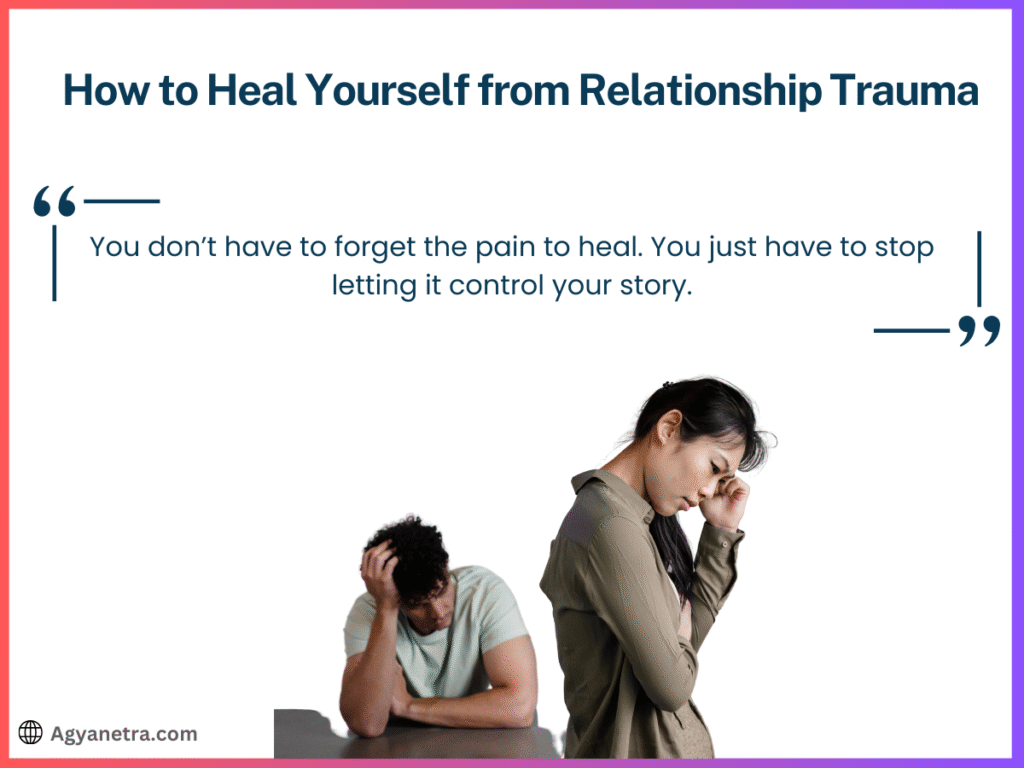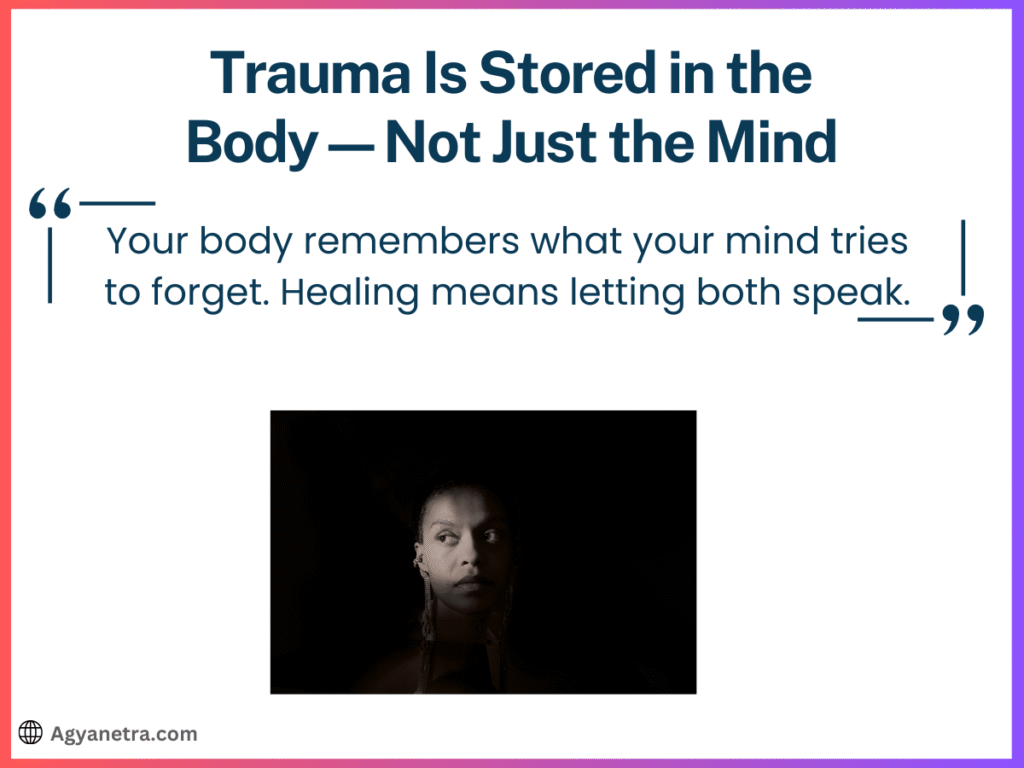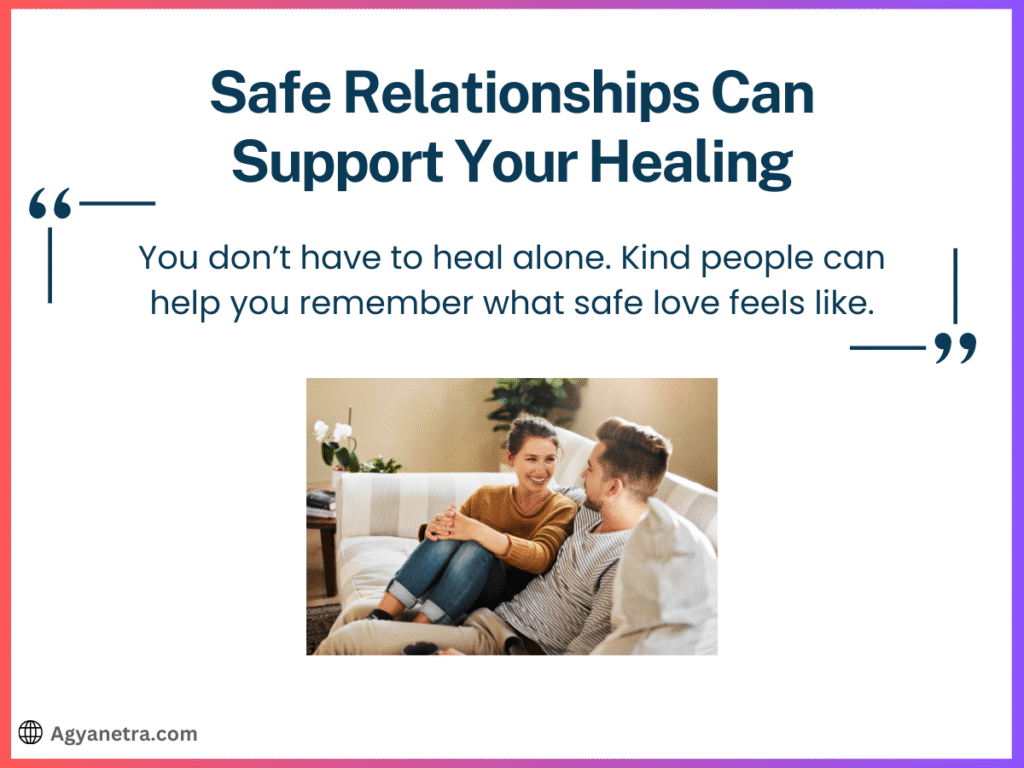How to Heal Yourself from Relationship Trauma? Relationship trauma can feel like your world has been turned upside down.
It’s not just about getting over a breakup. It’s deeper—it touches your sense of safety, your identity, and your ability to trust again.
Whether caused by emotional abuse, neglect, betrayal, or manipulation, this kind of trauma can leave long-lasting emotional wounds.
But healing is possible. You don’t have to stay stuck in the pain forever. You can rebuild your life, reconnect with yourself, and experience love in a healthy way.
Let’s explore how you can start healing from relationship trauma and create emotional safety within.
How to Heal Yourself from Relationship Trauma? Explained
Relationship trauma doesn’t just hurt your heart—it changes how you think about love, connection, and even yourself.

These deep emotional wounds often result in negative beliefs that affect your future relationships.
After being hurt, you may begin to believe things like:
- I’m not worthy of love
- Love always leads to pain
- I have to work hard to earn someone’s affection
- Being vulnerable will only get me hurt
These thoughts aren’t random. They form as a way to protect yourself after emotional damage.
For example, someone who was constantly ignored by their partner may begin to believe that their needs don’t matter.
Unfortunately, these beliefs don’t help in the long run. They keep you in survival mode.
You might even end up choosing emotionally unavailable or toxic partners because chaos feels familiar, not because you enjoy it.
Healing starts when you notice these patterns and begin to challenge them. Ask yourself, “Is this really true, or is it a belief shaped by pain?”
Why Rebuilding Self-Trust Matters More Than Moving On
After trauma, people often focus on “moving on.” But real healing isn’t just about time passing. It’s about learning to trust yourself again.
Emotional trauma often shakes your confidence and makes you question your own decisions.
You might find yourself thinking:
- Why didn’t I see the red flags?
- Why did I stay so long?
- How did I let this happen?
These are signs of inner confusion, not weakness. Trauma creates what psychologists call epistemic wounds—damage to your sense of knowing. You stop trusting your own reality.
To heal, focus on rebuilding that self-trust:
- Practice small decisions daily to boost your confidence
- Reflect on what your gut told you during the relationship
- Set boundaries, even if they feel uncomfortable at first
For example, if your ex-partner often dismissed your emotions, try speaking up about how you feel with a friend you trust.
Little steps like this help your nervous system relearn what safety feels like.
Don’t Rush to Forgive if You’re Still in Pain
Forgiveness is often described as a key step in healing, but it’s not something you need to force.
In fact, rushing to forgive someone who hasn’t taken responsibility can make your healing harder.
In many emotional trauma cases, people forgive just to move on, but deep down they still feel hurt, angry, or confused.
That’s because the pain hasn’t been processed—it’s just been buried.
Instead of pushing forgiveness, try focusing on what you feel. It’s okay to feel angry. It’s okay to grieve. These emotions are not bad. They’re part of your healing journey.
For instance, if you were ghosted after opening your heart to someone, that pain doesn’t just disappear by saying, “I forgive them.”
You need time to feel the sadness, process the confusion, and validate your experience.
Forgiveness, when it happens naturally, can be powerful. But it should never come at the cost of your emotional truth.
Trauma Is Stored in the Body—Not Just the Mind
Emotional pain doesn’t just affect your thoughts—it affects your entire body.
Relationship trauma can create physical symptoms like anxiety, panic attacks, insomnia, and even stomach problems.

This happens because trauma puts your nervous system in a constant state of alert.
Even after the toxic relationship ends, your body may still feel like it’s in danger.
Common signs include:
- Feeling hyper-aware or jumpy
- Trouble sleeping at night
- Shallow breathing or tight chest
- Random physical aches or digestion issues
Traditional talk therapy can help you understand what happened. But healing also needs to involve the body.
Try body-based therapies like:
- Trauma-informed yoga
- Somatic experiencing
- Breathwork and grounding exercises
- EMDR (Eye Movement Desensitization and Reprocessing)
For example, if someone had a partner who raised their voice constantly, even a loud sound can trigger a stress reaction. In this case, deep breathing or body scanning can help calm the nervous system.
Healing from relationship trauma means releasing what’s been held in your body for too long.
Reclaim the Version of You That Was Lost
One of the most painful parts of trauma is losing parts of yourself in the process. To survive the relationship, you may have silenced your voice, abandoned hobbies, or changed your personality.
This happens when you constantly had to keep the peace, please the other person, or stay quiet to avoid conflict.
Ask yourself:
- Who did I stop being to make the relationship work?
- What dreams did I put aside?
- What part of me felt ignored or forgotten?
For instance, maybe you loved painting but stopped because your partner mocked it. Or maybe you stopped laughing freely because you were always being judged.
Healing includes bringing those lost parts back into your life. Try doing one thing each week that reconnects you with the version of you that felt free, alive, and joyful.
This isn’t just self-care—it’s self-reclamation.
Safe Relationships Can Support Your Healing
There’s a common myth that you have to be completely healed before entering another relationship.
While self-awareness is important, it’s also true that safe, emotionally present relationships can help you heal further.

Being around kind, respectful people—whether it’s a friend, therapist, or partner—helps your brain and body learn what healthy connection feels like.
If your past experience involved manipulation or neglect, a person who listens, respects your boundaries, and stays consistent can help you rewire your expectations.
Healing doesn’t mean isolating yourself. It means choosing better.
For example, if your ex used to ignore your texts for days, a new friend who replies thoughtfully and shows up for you reminds your nervous system that you’re worthy of consistency and care.
Let safe people in. They can be a big part of your recovery.
Your Pain Is Valid—Even If It Wasn’t “Severe”
Many people question their trauma because it doesn’t fit the typical idea of abuse. You may think:
- “It wasn’t physical, so it doesn’t count.”
- “Other people have it worse.”
- “Maybe I was just being dramatic.”
This is called self-minimizing—and it’s very common among trauma survivors, especially those who experienced emotional or psychological abuse.
But trauma is not about how it looks from the outside. It’s about how it feels to you. If you were ghosted, breadcrumbed, manipulated, ignored, or constantly made to feel small—your pain is real.
For example, being told “you’re too sensitive” every time you express a need can make you question your own reality. That’s a form of emotional gaslighting—and it leaves deep scars.
Your experience matters. You don’t need extreme proof to honor your own healing.
How to Heal Yourself from Relationship Trauma: Final Thoughts
Healing from relationship trauma is a journey—not a quick fix. It’s about returning to yourself, not becoming someone else.
It means learning to trust your gut again, express your feelings without fear, and set boundaries that protect your peace.
Whether you’re recovering from emotional manipulation, abandonment, gaslighting, or betrayal, know that your pain is real, your story is valid, and your healing is possible.
The path forward may include therapy, body-based practices, self-reflection, and healthy connections.
Most importantly, it includes self-compassion. You are not broken. You are rebuilding.
By choosing to heal yourself from relationship trauma, you’re not just recovering from the past—you’re creating a new future where love feels safe, support feels natural, and your voice matters again.
FAQs
What is relationship trauma and how does it affect you?
Relationship trauma is emotional pain caused by toxic relationships, emotional abuse, or betrayal. It can affect your sense of safety, self-worth, and ability to trust others. Healing yourself from relationship trauma involves rebuilding your identity and creating emotional safety.
How do I start healing from relationship trauma?
Begin by recognizing your emotional triggers, setting boundaries, and practicing self-compassion. Healing yourself from relationship trauma also involves therapy, self-reflection, and reconnecting with safe, supportive people.
Can therapy help with relationship trauma recovery?
Yes, therapy is one of the most effective tools for healing relationship trauma. Trauma-informed therapists help you process emotional wounds, rebuild trust, and develop healthy relationship patterns using methods like CBT or EMDR.
How long does it take to heal from relationship trauma?
Healing yourself from relationship trauma varies for each person. It may take months or even years depending on the severity of the trauma, your support system, and the steps you take. Patience and consistent self-work are key.
What are signs that I’m healing from relationship trauma?
Common signs of healing include:
Feeling safe with yourself
Trusting your instincts again
Setting healthy boundaries
Engaging in healthy relationships
Experiencing less emotional reactivity
Is it normal to still feel hurt long after a toxic relationship ends?
Yes, it’s completely normal. Emotional wounds from trauma don’t heal quickly. If you’re still hurting, it means your body and mind are still processing. Healing yourself from relationship trauma takes time and ongoing care.
Can new relationships help in healing from past trauma?
Yes, safe and supportive relationships can help rewire your brain and redefine your sense of love. Being with someone emotionally present and kind can support you in healing yourself from relationship trauma.
What is somatic healing and how does it help with trauma?
Somatic healing focuses on releasing trauma stored in the body through physical movement and awareness. It helps in healing yourself from relationship trauma by calming the nervous system and processing emotions that words alone can’t reach.
Can journaling help with healing from relationship trauma?
14. Can journaling help with healing from relationship trauma?
Yes, journaling helps process thoughts and identify patterns. Writing daily about your feelings, fears, and goals creates emotional clarity and supports healing yourself from relationship trauma over time.
More Posts Like This
- The Power of Surrender in Love and Relationships
- How to Overcome Relationship Fear with Practical Tips
- Healing from Heartbreak and Moving On
- Understanding Depression: Breaking Stigmas and Finding Hope

Vidushi Gupta is a certified spiritual coach, energy healer, and emotional wellness counselor with over 10 years of experience guiding people through spiritual signs, emotional healing, and inner transformation. Her approach is grounded, fear-free, and focused on helping readers understand spiritual experiences with clarity and emotional balance.
With a background as a digital content strategist and published author of nearly ten novels, Vidushi has reached over 20 million readers worldwide through her writing. She is known for explaining complex spiritual ideas in simple, relatable language, making topics like repeating signs, intuitive shifts, and spiritual awakenings easier to understand and trust.
Through her work, she helps people connect everyday life experiences to deeper inner growth—gently, honestly, and without superstition.
Accuracy, Fact-Checking & Expert Oversight: Vidushi Gupta.
